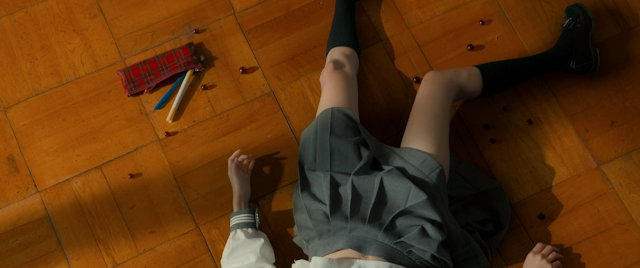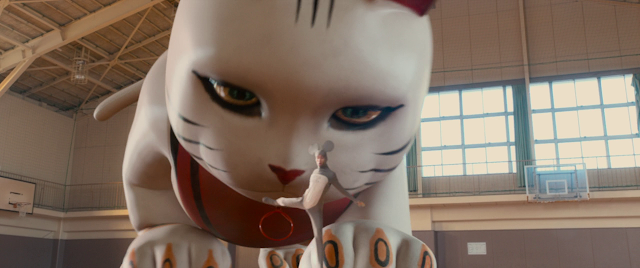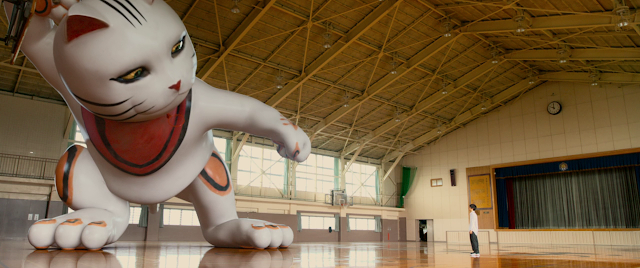Video Games, Media Critique and ReBoot Homage in Takashi Miike's "As The Gods Will"
I have a relationship with Takashi Miike dating back nearly 10 years, when I first opened myself up to Audition and Ichi the Killer in my mid-teens (back then, those were virtually every person's first Miike films; by far his most well known in North America). The morbid teen in me was drawn to his reputation as a shock master, but just a couple films in I realized he was so much more. He played with form in ways nobody else was doing. He was (and well, still sorta is) a director-for-hire, so not an auteur by the strictest of definitions (which is sorta why I don't take the auteur theory very seriously or look at it in narrow minded view), yet his films are so undeniably coated in his own unique aesthetic, sensibilities, and he frequently chooses scripts and film projects that carry with them a thematic consistently across his filmography (Tom Mes' fantastic book Agitator: The Cinema of Takashi Miike is thus far the definitive text on Takashi Miike and makes the best arguments for him as auteur-of-sorts). And yet, even in the stage of his career that gave us Audition, Ichi the Killer and some 40 odd other films, he was still in his formative years. Still learning. The Takashi Miike that emerged in 2010 with 13 Assassins has been on a career high peak ever since, delivering one fantastic slice of cinema after another. His craft is better than ever, as he enters the highest echelon of genre film makers.
Now we come to As The Gods Will, an adaptation of a manga, which by my count is his 5th or 6th amazing film in the last 5 years (and I still haven't seen Over Your Dead Body, which got a glowing review from Tom Mes on his website Midnight Eye). Its opening reel has gotten consistently high praise from just about everyone who has seen it, and is one of the most attention grabbing openers Miike's ever executed (think Dead or Alive-good). After an establishing shot outside, we cut to a high school classroom, the bloodied dead bodies of decapitated students scattered across the floor, with a diabolical looking CGI'ed Daruma ga Koronda sitting atop the teacher's desk. “If you move, you die,” utters one frightened classmate. The Daruma (which I'll call it for short, please excuse my inexperience towards the Japanese language) says its name, dragging out each syllable as long as possible. When it completes its name, it turns around, scanning the frightened faces of the teenagers, squaring in on the most frightened. He loses his balance, nearly falling. Wasting no time, the Damura nods towards the student, whose head immediately explodes. What we're seeing here is media's most violent depiction of Red Light, Green Light, the popular children's game. Also take note of the blood gushing out of each student's body. Liquid only for a split second, it morphs into hundreds of hard red balls, which spill across the floor. This isn't a playground children's game; this is a video game. The grisly murder of these students is a horrific act of violence, but is immediately trivialized when their corpses become nothing more than video game sprites. In story-less arcade-styled video games, you don't actually mourn the death of characters, do you, either NPC or player characters? Of course not. It's frustrating when it happens, but then you shrug it off and wait to play again. Only, in As The God's Will, there are no second lives. Real-world rules of life and death still apply, and it creates a fascinating juxtaposition between the grief felt from real life homicide (which really, is a genocide considering that millions of teenagers are actually dying in this world) and the trivialization of simply losing in a video game.
The Daruma ga Koronda is only the first boss/level in this film. There are five in total, and we go through them in order, with tension escalating from stage to stage. They don't necessarily become more difficult, as each one requires a different skill set to master (ranging from wit and athletics to sheer stoke of luck), but as with any game, dramatic tensions tend to build the closer one gets to the end.
As The God's Will can easily be compared to Battle Royale and The Hunger Games, narratives in which a malevolent authority forces high school students to kill one another for their own survival. I have not see The Hunger Games, but As The God's Will has far more going on in it than Battle Royale, as both a narrative and a film. Neither of the others takes it upon themselves to adapt a literal video game structure, which makes God's Will incredibly interesting to look at in its storytelling. Each stage vastly different from one another, from having the kids dress up as mice running away from a giant cat while trying to shoot a ball into its basketball-hoop collar, or playing a game of truths with a manic polar bear who is filled with murderous rage whenever somebody tells a lie.
This is a film with virtually no downtime. The Daruma ga Koronda sequence occasionally cuts to a brief backstory following the protagonist's life a little leading up his crimson soaked morning class; and by brief I mean just several minutes. Later in the film, we occasionally cut to life on the outside world, which fills in some of the exposition, but I find myself so enamored in this film's universe these scenes are just as riveting – and important - as the games of life and death.
The Japanese high school being bombarded with this mysterious evil isn't the only school being attacked. It's actually happening across the world, as we find out with clips from television media and a frenzied public going into hysterics, mourning the deaths of millions of youths worldwide. Shades of The Suicide Club or even The Cabin in the Woods here. Then things take a turn. We cut back to the outside world several more times. The life and death video game challenges are being displayed on television (being magically broadcast from the aliens or gods responsible; this is not the doing of humankind). People are getting invested in this blood and guts narrative of survival. God's Children, the winners of the games are labelled. The world no longer mourns the dead; it celebrates the living. This is a critique on violent media, both fiction and non-fiction; how the former brings out a blood thirsty lust in some, and how the latter becomes trivialized (there's that word again) in favour of a good narrative. It also brings to mind attitudes towards video games, and how we don't reflect on all the times we lost or died in a game, or think about all the characters we have to kill while playing a game to reach the end. Those lives don't matter. We play to win, we play to reach the end, we play for the congratulations of others and/or our own sense of self satisfaction. This attitude makes perfect sense within the context of games and is never questioned. As The God's Will takes those feelings and attributes them to the real world.
There's a fun visual moment I want to briefly touch on. During one of the outside world scenes, explaining how schools all over the world are being invaded by evil aliens/gods for these death games, it illustrates the action by depicting large solid purple cubes descending from the sky, floating across cities, and landing on top of high schools, with the buildings becoming physically trapped inside the cubes, and isolated from the rest of the world. People outside the cube cannot physically enter the monolithic structure. Canadians might get a flashback to ReBoot reading this paragraph, the Canadian-made CGI animated television series from 1994-2001. The kid's show took place inside a computer, and the real world owner of the computer would frequently play video games. When this happened, a cube identical in appearance to the one in As The Gods Will, would descend from the sky, and land over a portion of the city. The self-assigned heroes of the computer society would have to race as fast as they could underneath the cube as it was falling (they couldn't get through it once it already landed, again like in the film), in order to compete in the games. They then played literal video games against the User to ensure the safety of the computer society (okay, the premise is wonky if you try to look at it from a real world perspective, but it's a genre kids show, so cut it some slack). I'm not sure what the possibilities are of As The Gods Will – either the manga or the film – taking direct influence from ReBoot, but I'd be delighted if this was intentional homage and not just coincidence.
Takashi Miike is misunderstood. Many of his critics and even fans will say he indulges in weirdness for the sake of weirdness, and nothing more. Because he's a genre filmmaker, and because his films are offbeat, they dismiss the possibility that perhaps Miike is making important cinema, or great cinema, or really incredible one-of-a-kind cinema. As The Gods Will is certainly one of his “weirder” movies when compared to more conventional cinema, whatever that even means, if anything. But it is not a surface level quality. This film is as formally outrageous as its narrative demands. Imagine if this premise were played straight, with no fun visual language of its own, relying entirely on plot. It would be banal (it would be garbage like Battle Royale). Miike gravitates towards narratives that have an absurd twist, and slices them together in a colourful fashion modeled after how video games and comics are structured. Ace Attorney, The Mole Song and As The Gods Will are stylistically so innovative because they arguably borrow more from comics and games than they do other films. Just look at the matte coloured backdrop that populates Gods Will's final stage, which is reminiscent of many scene backdrops and stage arenas in JRPG and arcade fighting games out of Japan, from Chrono Cross to Street Fighter.
 |
| Chrono Cross (1999, PlayStation) |
 |
| Street Fighter II (1991, various consoles) |
I won't give Miike all of the credit, as much as I do recognize his own
strengths. Kenji Yamashita deserves a lot of praise, as well. He has
been the editor on every Miike film from 2009 to now, which maybe
not-so-coincidentally lines up with what I consider to be Miike's
strongest era. Miike's cinema post-Yamashita generally has a sharper
sense of pacing and cutting and his pre-Yamashita years. He's also grown
more confident in his own right, emerging as a masterful creator of
images. This is probably also in part because of higher production
values than he had in his earlier years, and also because he's slowed
down to making just two or three films per year, perhaps now putting
more time into each feature than when he was making six and seven films
per year.















Comments
Post a Comment